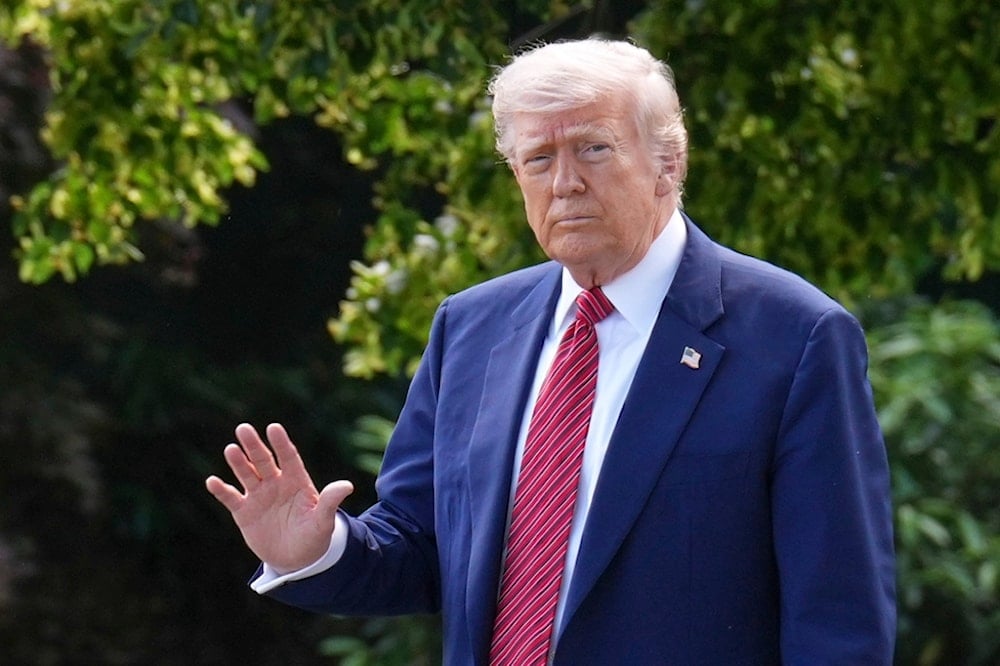Trump says growing ‘less confident’ US-Iran will reach deal
The US president warns that Tehran won't get nuclear weapons, with or without an agreement.
-

US President Donald Trump waves as he departs the White House, May 23, 2025, in Washington (AP)
US President Donald Trump has expressed growing skepticism over the prospects of reaching a nuclear agreement with Iran, stating that he is “less confident” now than in previous months. Speaking on the Pod Force One podcast hosted by Miranda Devine, Trump pointed to delays on the Iranian side as a sign that negotiations may be faltering.
“I don’t know. I did think so, and I’m getting more and more, less confident about it,” he said. “They seem to be delaying, and I think that’s a shame, but I’m less confident now than I would have been a couple of months ago. Something happened to them, but I am much less confident of a deal being made.”
Notable shift in tone
Trump’s remarks reflect a notable shift in tone as the sixth round of nuclear talks between Iran and the US is expected to begin this weekend. The US administration had previously indicated cautious optimism about the possibility of renewing negotiations that would curb Iran’s nuclear program in exchange for sanctions relief.
Regardless of whether a deal is reached, Trump insisted that Iran would not be allowed to acquire nuclear weapons. He emphasized that his administration remains committed to ensuring Tehran does not achieve that capability.
“Well, if they don’t make a deal, they’re not going to have a nuclear weapon,” Trump said. “If they do make a deal, they’re not going to have a nuclear weapon, too, you know? But they’re not going to have a new nuclear weapon, so it’s not going to matter from that standpoint.”
He continued, “But it would be nicer to do it without warfare, without people dying, it’s so much nicer to do it. But I don’t think I see the same level of enthusiasm for them to make a deal. I think they would make a mistake, but we’ll see. I guess time will tell.”
Trump's comments underscore the challenges facing his foreign policy team as they try to revive diplomacy with Tehran amid rising regional tensions.
'No nukes main foundation for deal'
Iranian Foreign Minister Abbas Araghchi expressed optimism about the potential for a swift and mutually beneficial agreement.
Posting on X, Araghchi noted that US President Donald Trump had entered office with a position that aligns with Iran’s stated doctrine: “Iran should not have nuclear weapons.” Araghchi suggested that this shared stance “could become the main foundation for a deal.”
President Trump entered office saying that Iran should not have nuclear weapons. That is actually in line with our own doctrine and could become the main foundation for a deal.
— Seyed Abbas Araghchi (@araghchi) June 11, 2025
As we resume talks on Sunday, it is clear that an agreement that can ensure the continued peaceful…
He emphasized that a rapid resolution is within reach, stating, “An agreement that can ensure the continued peaceful nature of Iran's nuclear program is within reach—and could be achieved rapidly.”
According to Araghchi, any successful agreement must balance both sides’ interests. “That mutually beneficial outcome relies on the continuation of Iran's enrichment program, under the full supervision of the IAEA, and the effective termination of sanctions,” he wrote.
The comments reflect a broader sentiment within Iran that dialogue must not come at the cost of sovereignty or security, especially while the US continues to maintain a military footprint across the region.
Iran warns of retaliation if talks fail
Meanwhile, as the negotiations hang in the balance, Iran’s Defense Minister Aziz Nasirzadeh issued a stark warning on Wednesday. Should the talks collapse and tensions escalate into conflict, Iran would target US military bases in the region.
“If nuclear negotiations fail and conflict arises with the United States, Iran will strike American bases in the region,” Nasirzadeh said, reinforcing the Iranian government's longstanding threat of retaliatory measures.
The upcoming round of nuclear talks could prove decisive in determining whether the two sides can avert a further escalation. However, with Trump now expressing doubts and Tehran signaling readiness for confrontation, prospects for a peaceful resolution remain uncertain.

 4 Min Read
4 Min Read









